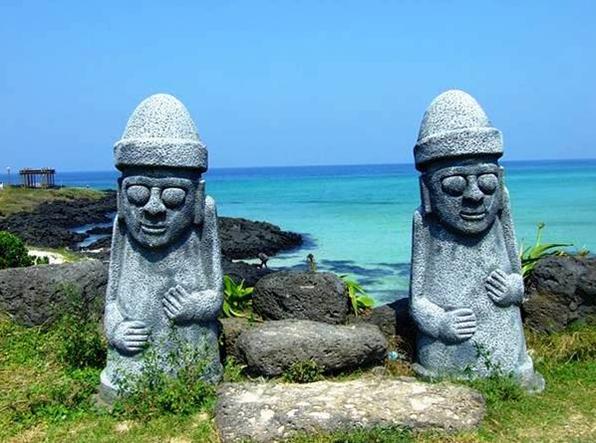
What is special about Jeju?
Jeju is tranquil and simple, makes every tourist feel like they going back to that familiar hometown way off in the far far distance. Setting your footsteps on this beautiful and seductive land, you just can’t stop yourself from unconciously walking around all the famous places, feeling the wonderfulness of the windy hills and joining a local festival to feel the warmest welcome ever from locals just like when a son who was away for so long now has returned.
Jeju Island at the first glance
Jeju Island, a paradise for lovers to enjoy their sweet honeymoon. With area of 1.800km2 and population of approximately 550,000 people, Jeju Island has the natural effects of sun and wind and unique stratigraphic architecture, also three things “are stables of Jeju culture: rock, wind and women. Women on the island are mainly engaged in diving for fish, shrimp, seaweed and algae. Despite some of them being quite old many of them are still capable of diving with the ability to hold their breath for 2 minutes at a depth of 20 m. In particular, the island’s soil is suitable for the cultivation of fruit tree mainly for export.
The legend of “grandfather – grandmother”
Formed by lava flows from volcanic eruptions over 2 million years ago and existing in the middle of the ocean with numerous mysterious stone columns, Jeju is sacred, exotic and quite seductive to all tourists. Jeju is not only unique thanks to stone pillars with countless shape but also by the legendary story of two stone statues: grandfather and grandmother. These two statues stand still together, presents almost everywhere on the island: scenic spots, on the streets and public places … even in front of each house in the ethnic villages of Jeju.
The Islanders recalled that, long time ago there was no such a thing called ‘grandfather’ statue because the ancestor of Jeju is a woman. That is the reason why when it comes to Jeju people often refer to women. ‘Grandmother’ statue is not only kindly placed at the entrance of the village as a “village keeper” but also used as the milestone on the main road. When commuting, just by counting the number of “grandmother”statues you can easily estimate how far you have gone. Occasionally, in order to prevent the truck entering the village, the Jeju islanders set up more ‘grandfather’ statues to the opposite side of ‘grandmother’ statue at the entrance. The distance between the two statues is quite limited to allow any kind of vehicles to enter the village.
Since then, the two statues has been regarded as the symbol of prosperity because they are crafted in the shape of linga. If you do not have children and wish to have children as you want, you should go to Jeju and try laying hands on “grandfather”’s nose if you want to have sons and “grandmother”’s nose if you want to have daughters .
STONE
Jeju island is formed by the lava of the volcano, the Mount Halla’s volcanic activity has stopped for a long time. Stone here is present in many aspects of the locals’ lives. Jeju Stone is black, spongy, porous, lightweight and absorbent. Stone is mainly used for construction, for building up landmarks that separates the village other villages or tombs. We can say, the culture of this island is closely attached to the stone.
WIND
Jeju Island attracts a lot of wind due to its geographical location. The effect of wind is shown very clearly in the lives of the people here. Names of wind here is diversified, for example the westerly (Hanuibaram), the northwesterly (Nophanuibaram), the northeast (Nopsaebaram), the east (setbaram), the south (maparam), the southeast (dongmaparam) , Galbaram, Seotbaram, Seothanuibaram, Yangtosaebaram, Yangbaram … Jeju islanders have made a huge effort to resist wind and by that way gave birth to a very nice wind culture. Today, in a new era of modern science and technology, Jeju wind has been used to generate electricity for every house on Jeju-do.
WOMEN
There is one thing that is a fact, the women of Jeju are not beautiful when compared to Seoul girls with their pink blush faces. So many people would be surprised to hear the stories about Jeju women from tourists who have visited here. Jeju women are considered to be unique because they are the main workforce on this island. They have a terrific ability for diving, childcare and housework. In ancient times, the male islanders were able to have more than one wife and the need to not do anything. What really surprised and impressed tourists is the “tricks” of Jeju women: diving. Only with tight leather outfit and some rudimentary tools, the women can dive deep into the sea and collect abalone, sea cucumber, squid, snails … to trade and earn a living.










